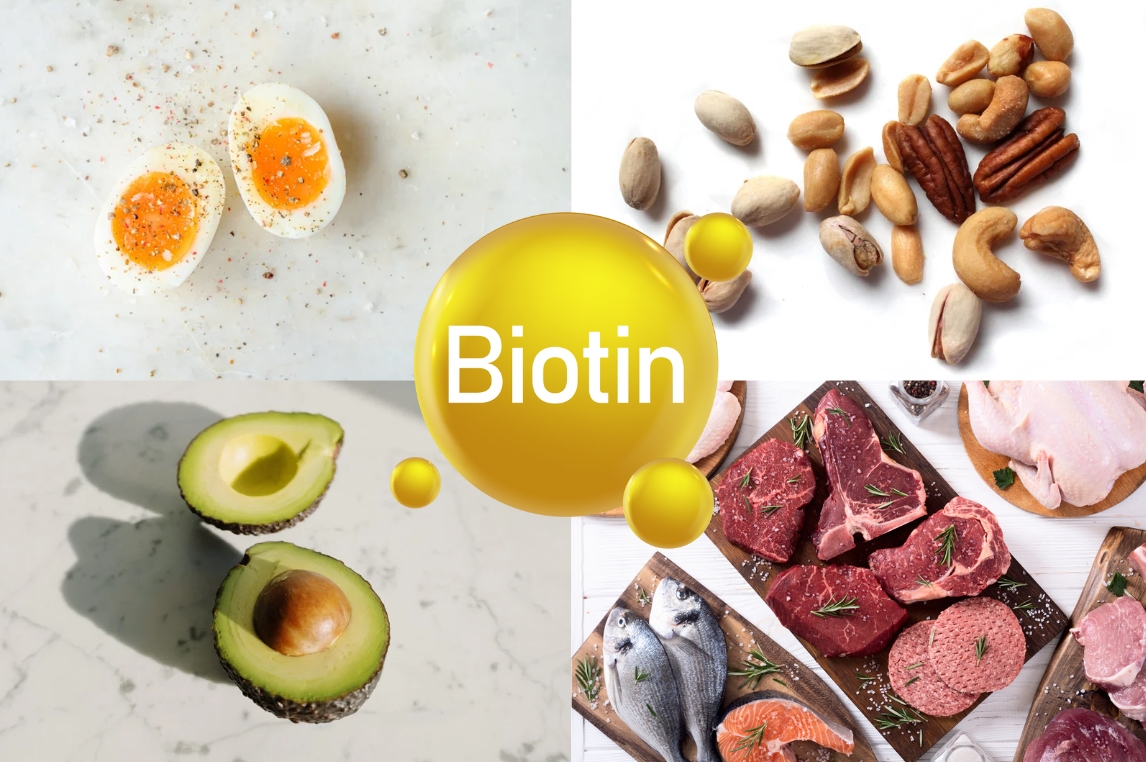As a vital B vitamin, biotin holds a special place in nutrition and wellness. It plays a crucial role in a body’s metabolism, acting as a key nutrient that helps convert food into energy. It is important to know that it was originally known as vitamin H, which has been recognized as an essential micronutrient since 1927. It is a part of numerous products that can be found on the market.
Also known as vitamin B7, biotin is indispensable for metabolizing glucose, fatty acids, and amino acids, contributing significantly to my overall health and well-being. However, I recognize the importance of finding a balance between necessary intake and the potential for over-supplementation.
That is why, I want to provide you with an insight into this subject and provide some more interesting details regarding this vitamin.
Overusing Biotine
The question of whether one can take too much biotin is complex. Given that biotin is a water-soluble vitamin, the body is adept at flushing out excess amounts, making biotin toxicity rare. However, this does not mean that high doses are always without consequence.
While there is no established upper limit for intake, consuming extremely high levels, especially from supplements, can lead to certain side effects. Some individuals report experiencing mild symptoms like nausea, gastrointestinal upset, and skin rashes.
More significantly, high levels can interfere with certain lab tests, leading to inaccurate results. This interference is particularly concerning for tests related to thyroid hormones and cardiac troponin, which are crucial for diagnosing heart and thyroid conditions.
While an overdose is unlikely to cause severe health issues, it’s important to be mindful of the dosage, especially if undergoing medical tests. Informing healthcare providers about supplementation is crucial to avoid misinterpretation of lab results.
Side Effects of Excessive Biotin Intake
Excessive biotin intake, particularly from high-dose supplements, can lead to several side effects, although they are generally mild.
Mild Side Effects
Commonly reported issues include digestive problems such as nausea and an upset stomach. These symptoms are more likely to occur when the intake of biotin significantly surpasses the recommended daily amount.
In addition to gastrointestinal discomfort, some individuals might experience skin rashes, a less common but notable side effect. Another rare but potential consequence of high biotin intake is an increase in blood sugar levels, which could be a concern for individuals with diabetes or those at risk of developing diabetes.
Serious Implications
A more significant concern associated with high biotin intake is its potential to interfere with certain laboratory tests. It can affect the accuracy of immunoassays, which are used in a variety of medical tests, including those for thyroid function and cardiac troponin levels.
This interference can lead to false results, either falsely high or low, which can be particularly problematic. For instance, inaccurate thyroid function test results could lead to a misdiagnosis of hyperthyroidism or hypothyroidism, while incorrect cardiac troponin levels might result in a missed or false diagnosis of a heart attack.
These inaccuracies in lab tests can have serious implications for patient care, leading to inappropriate or delayed treatment.
Benefits of Biotin
Biotin has a significant number of benefits it provides to its consumers. But the most important ones are hair and nail benefits.
Hair Health
Biotin is widely recognized for its positive impact on hair health, making it a popular ingredient in many hair care supplements. Its primary role in the body involves metabolizing amino acids, which are essential for protein synthesis, which is similar in the case of argan oil.
Since hair is primarily made of protein, specifically keratin, its involvement in protein creation is crucial for maintaining and improving hair health. Individuals who suffer from biotin deficiency often experience symptoms like hair thinning and loss.
Of course, mixing essential oils with standard ones is crucial in doing so.
Supplementing has been shown to aid in hair growth, leading to fuller and healthier hair. Clinical studies have supported these claims, demonstrating that biotin supplementation can result in significant improvements in hair growth, particularly in individuals with existing deficiencies.
Users frequently report enhanced hair strength, reduced hair fall, and improved hair texture, although these effects can vary from person to person. Another solid option in this case can be Wild Growth Oil.
Nail Strength
Biotin’s benefits extend to nail health as well. Brittle nails, prone to splitting and breaking, can be a sign of biotin deficiency. Biotin plays a vital role in the growth and strengthening of nails. Clinical research has indicated that increased biotin intake can lead to stronger, more resilient nails.
This is particularly beneficial for individuals who experience brittle nails, as it helps in improving the keratin infrastructure, which is a fundamental component of nails. Studies have shown that biotin supplementation can lead to a noticeable improvement in nail strength and thickness.
Users often observe a reduction in nail splitting and an overall enhancement in nail health.
Recommended Daily Intake of Biotin
The recommended daily intake of biotin for adults is set at 30 micrograms (mcg), a level that is generally easy to achieve through a balanced diet. However, many over-the-counter biotin supplements offer significantly higher doses, often ranging from 5,000 to 10,000 mcg per capsule.
This substantial difference raises questions about the necessity and safety of such high dosages. While it is a water-soluble vitamin, meaning excess amounts are typically excreted in urine, the trend of high-dose supplements has become a topic of debate among health professionals.
The rationale behind these high doses is to ensure the body absorbs as much as it needs, particularly for those seeking to improve hair and nail health. However, it’s important to consider that such high levels far exceed what is necessary for the average person.
When considering supplementation, it’s crucial to assess dietary intake and individual health needs. For most people, a well-balanced diet provides sufficient biotin, making high-dose supplements unnecessary. Consulting with a healthcare provider can help determine the appropriate dosage based on individual health conditions and dietary habits.
What are Some Biotin-Rich Foods?
Adding biotin-rich foods into your diet is an effective way to meet the daily recommended intake of this essential B-vitamin. Biotin can be found in a variety of both plant and animal-based foods, making it accessible to people with different dietary preferences.
| Food Source | Biotin Content | Serving Size |
|---|---|---|
| Egg (whole, cooked) | 10 mcg | 1 large egg |
| Almonds | 1.5 mcg | 1/4 cup (about 23 nuts) |
| Sweet Potato | 2.4 mcg | 1/2 cup, cooked |
| Salmon | 5 mcg | 3 ounces |
| Avocado | 1.85 mcg | 1 whole avocado |
| Sunflower Seeds | 2.6 mcg | 1/4 cup |
| Broccoli | 0.4 mcg | 1/2 cup, cooked |
| Whole Wheat Bread | 0.02 – 6 mcg | 1 slice |
Eggs
Eggs, particularly the yolks, are a powerhouse when it comes to biotin content. They are one of the richest natural sources of this essential B-vitamin. The biotin in egg yolks plays a crucial role in maintaining healthy hair and nails, making eggs a go-to food for those looking to boost their intake naturally.
Including eggs in your diet, whether boiled, scrambled, or as part of other dishes, can significantly contribute to meeting your daily biotin requirements.
Avocados
Avocados are not only celebrated for their healthy fats but are also a good source. This superfood’s biotin content contributes to its numerous health benefits, including supporting hair and nail health.
Avocados can be enjoyed in various ways, from being a key ingredient in guacamole to a delicious addition to salads and sandwiches, making them a versatile choice for boosting biotin intake.
Nuts and Seeds
Nuts and seeds, such as almonds and sunflower seeds, are convenient and nutritious sources of biotin. These can be easily added to your diet as snacks or as part of various recipes. Nuts and seeds are not only beneficial for their content but also provide healthy fats, proteins, and other vitamins and minerals.
Biotin in Meats and Fish
For non-vegetarians, certain meats and fish are good sources of biotin. Salmon, for instance, is known for its content along with its omega-3 fatty acids. Including these in your diet can contribute to your biotin intake while also providing other essential nutrients.
FAQs
Epilogue
Biotin, an essential B-vitamin, holds significant importance in the metabolism of glucose, fatty acids, and amino acids. Our bodies indeed need a certain level for optimal health, but the question of overconsumption presents a complex scenario.
From my perspective, the high doses of biotin often found in supplements are generally safe, considering the vitamin’s water-soluble nature. However, I’ve learned that taking in excess can lead to some minor side effects and might even interfere with the accuracy of certain laboratory tests.
















